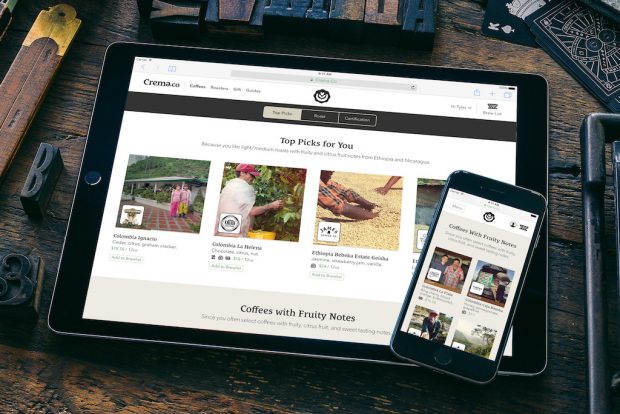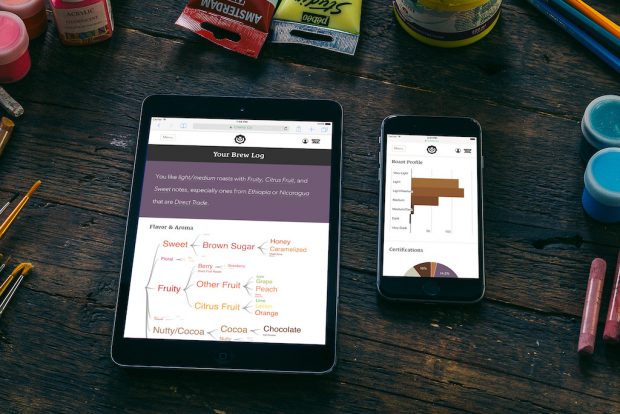Online coffee retail and delivery subscription services are a standard offering among roasters with active web presences, and in the still nascent but rapidly evolving aggregative third-party retail segment, differentiation is arguably even more crucial to success than it is for the roasters whose coffees they curate.
One such service that appears to be pulling ahead of the pack in terms of innovation and unique consumer guidance is Crema.co, an online multiroaster marketplace that launched in December 2015 with a exceptional balance of preserving each roaster’s brand identity, presenting detailed information on each coffee and a convenient, flexible user experience that we took note of earlier this year.
This week Crema.co has announced a comprehensive upgrade to its services with the rollout of three new aspects: a rating system; a visualized, customer-facing record of tastes and preferences called a Brew Log; and a system of recommendations based on all of this collected data.
The rating system is a simple one-click icon, thumbs up or thumbs down. This rating remains visible to the customer on that coffee’s listing on Crema.co’s pages of offerings, which helps customers to remember which coffees they did and didn’t like. However, these ratings are only visible to each individual customer, in order to encourage honest participation.
By keeping the info private, no one has any cause for reluctance in giving a thumbs-down rating that might in any way influence other potential customers away from a given small business. Not even the roasters get to see the ratings — it’s purely for the customer’s own personal taste-establishing record.
Meanwhile Crema.co’s system does process the preferences in the background, applying the rating to a dissemination of coffee specs including various flavor notes, origin, variety, processing method, roast profile, certifications, trade model, and more. Taking cues from the SCAA Flavor Wheel, the World Coffee Research lexicon and the Myers-Briggs Type Indicator personality test, the Crema.co system then automatically generates a detailed but easy-to-read report, including various visualizations, of a customer’s “coffee personality.” The company says this report grows increasingly accurate the more a customer buys and rates coffees through their system.
Finally, the information is also filtered into highly personalized product recommendations, which is just one more filtered view through which customers can differentiate among the coffees Crema.co offers.
“Spotify, Netflix, and other online hubs have long worked to learn their users’ tastes in subjective genres like music and movies and then provide personalized recommendations,” Crema.co founder and CEO Tyler Tate told Daily Coffee News. “We’re applying a similar approach to coffee.”
Crema.co’s roster of roasters has roughly doubled in their first six months in operation. Tate said that the company enlists new roasters through a combination of their own outreach and roaster-initiated relationships.
“So far this year we’ve been adding one to two new roasters each month, and plan to continue that trend,” said Tate. “We know who the next four roasters will be, and we also have about 25 new coffees that will be coming online over the next few weeks on the back of the Central American harvest season.”
As for whether Crema.co might cross the line into collaborating with roasters on exclusive, custom Crema blends or limited-edition microlot offerings, Tate said, “We don’t see ourselves offering a proprietary line of coffee right now, no. We’re here to connect coffee drinkers with the many outstanding roasters across the country who already produce exceptional coffee.”
Recommendations are available to customers after their first purchase. A custom Brew Log is now available to customers that have purchased and rated at least three coffees. Looking ahead, Tate said that their systems and services are very iterative, and that refinements and subtle changes are likely as kinks are addressed and feedback is considered.
Howard Bryman
Howard Bryman is the associate editor of Daily Coffee News by Roast Magazine. He is based in Portland, Oregon.








Comment